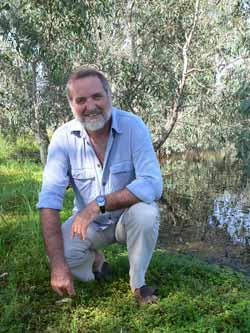 Director of Charles Sturt University’s (CSU) Institute for Land, Water and Society and Australian biodiversity expert, Professor Max Finlayson, was a co-ordinating lead author of the report’s chapter on biodiversity. This chapter assessed the state and trends of biodiversity in a global context.
Director of Charles Sturt University’s (CSU) Institute for Land, Water and Society and Australian biodiversity expert, Professor Max Finlayson, was a co-ordinating lead author of the report’s chapter on biodiversity. This chapter assessed the state and trends of biodiversity in a global context.Saving world biodiversity a must: CSU expert
7 JUNE 2012
Much greater effort is needed if we are to stop the loss and degradation of the world's biodiversity according to the latest assessment report on the world's environment, the fifth Global Environment Outlook (GEO-5), released on Wednesday 6 June. Director of CSU's Institute for Land, Water and Society, Professor Max Finlayson, was a co-ordinating lead author of the report's chapter on biodiversity.
Much greater effort is needed if we are to stop the loss and degradation of the world’s biodiversity according to the latest assessment report on the world’s environment, the fifth Global Environment Outlook (GEO-5), released on Wednesday 6 June.
 Director of Charles Sturt University’s (CSU) Institute for Land, Water and Society and Australian biodiversity expert, Professor Max Finlayson, was a co-ordinating lead author of the report’s chapter on biodiversity. This chapter assessed the state and trends of biodiversity in a global context.
Director of Charles Sturt University’s (CSU) Institute for Land, Water and Society and Australian biodiversity expert, Professor Max Finlayson, was a co-ordinating lead author of the report’s chapter on biodiversity. This chapter assessed the state and trends of biodiversity in a global context.Professor Finlayson said the main messages from the report are:
1. The pressures on biodiversity are increasing, with added pressure from climate change;
2. The rate of loss of biodiversity is far too high and is increasing – “We are still losing species at a fast rate in many parts of the world,” he said;
3. The benefits that people get from biodiversity are at risk and are unequally shared around the world; and,
4. “Our responses are inadequate. We have had some successes around the world but we need to do more; we need to have ongoing and concerted effort to stop and reverse the loss of biodiversity.”
“Governments around the world now have an information base to be able to take the necessary actions,” Professor Finlayson said.
“We have globally agreed targets for biodiversity but what we really need to do now is translate our information and knowledge into action in all parts of the world.
“Australia, unfortunately, has a very bad record of biodiversity loss but we do have a lot of information and our institutions are strong and in place. We need to transfer that knowledge and information into ongoing action.
“While we are taking action in Australia, we can also help a lot of other countries who may not have the same science or information base we have. We have expertise that we can share with other countries.”
The United Nations report was released on Wednesday 6 June in Rio de Janeiro, Brazil.





Social
Explore the world of social